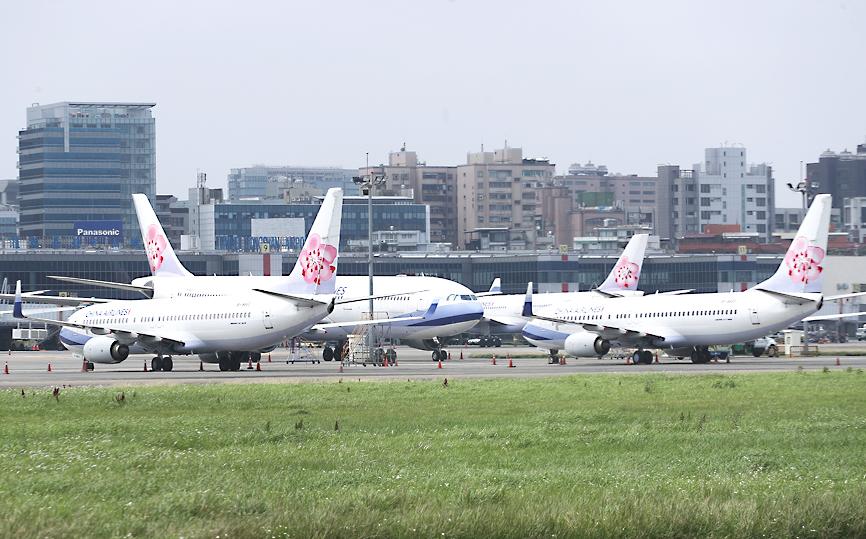Taiwanese airlines might repurpose passenger jets to carry cargo in their cabins to offset lost revenue amid the COVID-19 pandemic.
Airlines are considering applying to the Civil Aeronautics Administration (CAA) for permission to transport cargo in passenger cabins after Starlux Airlines Co (星宇航空) last month became the first among the nation’s airlines to offer cargo-only flights using the normal cargo holds of its three Airbus SE A321neo passenger jets.
“We are considering whether to increase our capacity by putting cargo on passenger seats,” Starlux spokesman Nieh Kuo-wei (聶國維) told the Taipei Times by telephone. “The advantage is that we can improve revenue, although fastening the cargo might scuff our brand-new seats.”

Photo: CNA
“We are still evaluating whether the plan has merit,” Nieh said.
The airline has been focused on cargo services between Taiwan and Macau and Penang, Malaysia, to mitigate the effects of faltering passenger business due to travel restrictions, he said.
EVA Airways Corp (長榮航空), which has five Boeing 777 cargo aircraft, and China Airlines Ltd (CAL, 中華航空), with 18 Boeing 747 cargo aircraft, have applied to the CAA to provide cargo-only flights using the holds of passenger jets in the near term, they said.
They are assessing whether to boost capacity by using passenger seats, with a decision to be made after the CAA provides official documents.
“It is tempting given that demand for air cargo is still strong worldwide due to the cancelation of many passenger flights,” an airline manager said by telephone on condition of anonymity. “However, there is so much to evaluate, including training of loading personnel, as we have never done cargo-only flights using passenger cabins before.”
The comments came after the CAA, which has rules that passenger jets may only carry goods in their holds, last week announced that it would relax the conditions to allow airlines to load cargo in passenger cabins to increase their freight capacity.
The regulator is expected to release documents and guidelines for the safe transportation of cargo in passenger cabins today, CAA Flight Standards Division director Clark Lin (林俊良) said by telephone.
“In principle, we will approve the practice if airlines fasten goods securely and have good control over weight and balance,” Lin said.
Cargo can only be carried on seats, in overhead storage bins or in under-seat stowage areas, or in aisles if it is in boxes or bags and strapped down with netting to prevent movement, which would create a hazard if the weight shifted, he said.
Airlines would not be required to provide flight attendants for the cargo-only flights, but should have sufficient crew on board to help load and unload, he said.
While some foreign regulators have allowed airlines to remove seats to increase cargo capacity, the CAA would not allow this for the time being, given that the removal of the seats would “substantially change the way a plane’s balance is calculated,” he said.

In Italy’s storied gold-making hubs, jewelers are reworking their designs to trim gold content as they race to blunt the effect of record prices and appeal to shoppers watching their budgets. Gold prices hit a record high on Thursday, surging near US$5,600 an ounce, more than double a year ago as geopolitical concerns and jitters over trade pushed investors toward the safe-haven asset. The rally is putting undue pressure on small artisans as they face mounting demands from customers, including international brands, to produce cheaper items, from signature pieces to wedding rings, according to interviews with four independent jewelers in Italy’s main

Japanese Prime Minister Sanae Takaichi has talked up the benefits of a weaker yen in a campaign speech, adopting a tone at odds with her finance ministry, which has refused to rule out any options to counter excessive foreign exchange volatility. Takaichi later softened her stance, saying she did not have a preference for the yen’s direction. “People say the weak yen is bad right now, but for export industries, it’s a major opportunity,” Takaichi said on Saturday at a rally for Liberal Democratic Party candidate Daishiro Yamagiwa in Kanagawa Prefecture ahead of a snap election on Sunday. “Whether it’s selling food or

CONCERNS: Tech companies investing in AI businesses that purchase their products have raised questions among investors that they are artificially propping up demand Nvidia Corp chief executive officer Jensen Huang (黃仁勳) on Saturday said that the company would be participating in OpenAI’s latest funding round, describing it as potentially “the largest investment we’ve ever made.” “We will invest a great deal of money,” Huang told reporters while visiting Taipei. “I believe in OpenAI. The work that they do is incredible. They’re one of the most consequential companies of our time.” Huang did not say exactly how much Nvidia might contribute, but described the investment as “huge.” “Let Sam announce how much he’s going to raise — it’s for him to decide,” Huang said, referring to OpenAI

The global server market is expected to grow 12.8 percent annually this year, with artificial intelligence (AI) servers projected to account for 16.5 percent, driven by continued investment in AI infrastructure by major cloud service providers (CSPs), market researcher TrendForce Corp (集邦科技) said yesterday. Global AI server shipments this year are expected to increase 28 percent year-on-year to more than 2.7 million units, driven by sustained demand from CSPs and government sovereign cloud projects, TrendForce analyst Frank Kung (龔明德) told the Taipei Times. Demand for GPU-based AI servers, including Nvidia Corp’s GB and Vera Rubin rack systems, is expected to remain high,